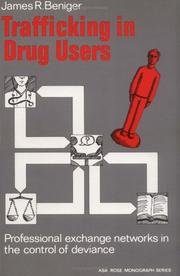| Listing 1 - 10 of 21 | << page >> |
Sort by
|
Book
Year: 1957 Publisher: New York (N.Y.) : Free press,
Abstract | Keywords | Export | Availability | Bookmark
 Loading...
Loading...Choose an application
- Reference Manager
- EndNote
- RefWorks (Direct export to RefWorks)
Group processes. --- Problem solving. --- Social control, informal. --- Social problems.
Book
ISBN: 0262030683 9780262030687 Year: 1979 Publisher: Cambridge (Mass.) : MIT press,
Abstract | Keywords | Export | Availability | Bookmark
 Loading...
Loading...Choose an application
- Reference Manager
- EndNote
- RefWorks (Direct export to RefWorks)
Psychiatry --- Social control --- Human behavior --- Power (Social sciences) --- Social Control, Formal --- Social Control, Informal --- Human behavior. --- Social control. --- Social control, Formal. --- Social control, Informal. --- Power (Social sciences).

ISBN: 0807029602 Year: 1976 Publisher: Boston (Mass.) : Beacon press,
Abstract | Keywords | Export | Availability | Bookmark
 Loading...
Loading...Choose an application
- Reference Manager
- EndNote
- RefWorks (Direct export to RefWorks)
Behavior modification. --- Operant conditioning. --- Behavior therapy. --- Social change. --- Social control, Formal. --- Social control, Informal.
Book
ISBN: 0128238070 9780128238073 9780128238066 0128238062 Year: 2021 Publisher: London : Academic Press,
Abstract | Keywords | Export | Availability | Bookmark
 Loading...
Loading...Choose an application
- Reference Manager
- EndNote
- RefWorks (Direct export to RefWorks)
"Big Data permeates all aspects of modern life, and while there is no shortage of potential benefits resulting from this, author Henrik Skaug Sætra argues that we must also understand the threats Big Data poses to liberty. The issues discussed in Big Data’s Threat to Liberty: Surveillance, Nudging, and the Curation of Information are related to how we are constantly under surveillance."--
Big data --- Social aspects. --- Data sets, Large --- Large data sets --- Data sets --- Artificial intelligence --- Social control. --- Liberty. --- Big Data --- Social Control, Formal --- Social Control, Informal --- Freedom --- Big Data. --- Social Control, Formal. --- Social Control, Informal. --- Freedom.
Book
ISBN: 0669928259 Year: 1974 Publisher: Lexington (Mass.) : Lexington books,
Abstract | Keywords | Export | Availability | Bookmark
 Loading...
Loading...Choose an application
- Reference Manager
- EndNote
- RefWorks (Direct export to RefWorks)
Social problems --- Criminal psychology. --- Deviant behavior. --- Social control. --- Social behavior disorders --- Social control, Formal --- Social control, Informal --- Essays.

ISBN: 039305201X Year: 2003 Publisher: New York (N.Y.) Norton
Abstract | Keywords | Export | Availability | Bookmark
 Loading...
Loading...Choose an application
- Reference Manager
- EndNote
- RefWorks (Direct export to RefWorks)
Happiness --- Medical innovations --- National characteristics, American. --- Self Concept --- Social Control, Informal --- Social Medicine --- Social medicine --- Social aspects --- National characteristics, American --- #GBIB:CBMER --- American national characteristics --- Innovations, Medical --- Medicine --- Medical technology --- Technological innovations --- Innovations
Book
ISBN: 1280581514 9786613611291 0123850126 0123850118 9780123850119 9780123850126 9781280581519 Year: 2012 Publisher: London : Elsevier,
Abstract | Keywords | Export | Availability | Bookmark
 Loading...
Loading...Choose an application
- Reference Manager
- EndNote
- RefWorks (Direct export to RefWorks)
People experiencing disorders in regulation are highly sensitive to stimulation from the environment, emotionally reactive, and have difficulty maintaining an organized and calm life style. They are impulsive, easily frustrated, and as a result make decisions that lead to an overwrought state-or who conversely retreat entirely from the world. This disorder is most likely to accompany diagnoses of bipolar or mood disorder, anxiety, depression, obsessive-compulsive disorder, Asperger’s syndrome, eating or sleep disorders, and/or attention deficit disorder. This book instructs therapists how best to treat the dysregulated adult, providing diagnostic checklists, and a chapter by chapter inventory in approaching treatment of dysregulation in a variety of life skills.
Identity (Psychology). --- Mental Disorders - therapy. --- Mental illness - Treatment. --- Self -- Social aspects. --- Self-control. --- Social Control, Informal. --- Social interaction. --- Mental illness --- Psychiatry and Psychology --- Sociology --- Social Sciences --- Anthropology, Education, Sociology and Social Phenomena --- Mental Disorders --- Social Control, Informal --- Psychiatry --- Health & Biological Sciences --- Psychiatric Disorders, Individual --- Psychotherapy --- Treatment --- Treatment. --- Adult. --- Sensory stimulation. --- Emotional Regulation. --- Emotion Regulation --- Emotion Self-Regulation --- Emotional Self-Regulation --- Emotion Self Regulation --- Emotion Self-Regulations --- Emotional Regulations --- Emotional Self Regulation --- Emotional Self-Regulations --- Regulation, Emotion --- Regulation, Emotional --- Regulations, Emotional --- Self-Regulation, Emotion --- Self-Regulation, Emotional --- Self-Regulations, Emotion --- Self-Regulations, Emotional --- Perception --- Senses and sensation --- Sensory deprivation --- Adults

ISBN: 0521257530 0521276802 0511598327 9780521257534 9780511598326 9780521276801 Year: 1983 Publisher: Cambridge Cambridge University Press
Abstract | Keywords | Export | Availability | Bookmark
 Loading...
Loading...Choose an application
- Reference Manager
- EndNote
- RefWorks (Direct export to RefWorks)
Control of illegal drug use and abuse requires an elaborate network of organizations and professions: medical, legal, political, educational, and welfare. This book, first published in 1984, explores the way in which these diverse sectors coordinate the control of deviance in a complex society and how they respond to a sudden widespread increase in deviance spanning many institutional and professional domains. The latter of these concerns, James Beniger argues, affords us a unique insight into the more general question of societal control. He takes as an example of this phenomenon the dramatic appearance of the 'drug problem' in America in the Vietnam war era of the late 1960s and early 1970s. Exploiting this as an approximation of an experimentally induced disruption of society, Professor Beniger examines its impact on the interorganizational and professional networks that together constitute a system for the control of a social deviance.
Drug abuse counseling --- Deviant behavior --- Youth --- Social structure --- Social control --- Case studies --- Drug use --- Deviant behavior. --- Social control. --- Social control, Formal. --- Social control, Informal. --- Substance abuse --- Case studies. --- Prevention and control --- Social Sciences --- Sociology --- Social conflict --- Liberty --- Pressure groups --- Deviancy --- Social deviance --- Human behavior --- Conformity --- Social adjustment --- Counseling --- Health counseling --- Drug abuse counseling - United States - Case studies --- Youth - Drug use - United States --- Social structure - United States
Book
ISBN: 9781509514656 9781509514663 Year: 2018 Publisher: Cambridge : Polity,
Abstract | Keywords | Export | Availability | Bookmark
 Loading...
Loading...Choose an application
- Reference Manager
- EndNote
- RefWorks (Direct export to RefWorks)
What do we know of the emotional life of the Middle Ages? Though a long-neglected subject, a myriad of sources provides clues to the central role emotions played in medieval society. In this work, historians Damien Boquet and Piroska Nagy reveal the many and nuanced experiences of emotion during the Middle Ages. From the demonstrative shame of a saint to a nobleman's fear of embarrassment, they show how emotions changed and developed, enabling us to better understand our own social outlooks and customs.
Emotions --- History --- Middle Ages --- Social aspects. --- History, Medieval --- Social Control, Informal --- Christianity --- History of Medicine, Medieval --- History of Medicine, Renaissance --- Medicine, Medieval History --- Medicine, Renaissance --- Medieval History (Medicine) --- Renaissance Medicine --- Medieval History --- Histories, Medieval (Medicine) --- History Medicine, Medieval --- History, Medieval (Medicine) --- Medieval Histories (Medicine) --- Medieval History Medicine --- Regret --- Feelings --- Emotion --- Feeling --- Regrets --- Human emotions --- Passions --- Psychology --- Affect (Psychology) --- Affective neuroscience --- Apathy --- Pathognomy --- history --- Europe. --- Northern Europe --- Southern Europe --- Western Europe --- Philosophy and psychology of culture --- Philosophical anthropology --- anno 500-1499
Book
ISBN: 9780199533848 0199533849 9780199686131 0199686130 0191740977 1280777206 0191612375 9786613687593 9780191740978 9780191612374 9781280777202 Year: 2012 Publisher: Oxford : Oxford University Press,
Abstract | Keywords | Export | Availability | Bookmark
 Loading...
Loading...Choose an application
- Reference Manager
- EndNote
- RefWorks (Direct export to RefWorks)
This title reconstructs the distinctive relationship between the house and masculinity in the 18th century; adds a missing piece to the history of the home, uncovering the hopes and fears men had for their homes and families.
Home --- Masculinity --- Authority --- Political science --- Authoritarianism --- Consensus (Social sciences) --- Masculinity (Psychology) --- Sex (Psychology) --- Men --- Families --- Marriage --- History --- History. --- Social aspects --- History of the United Kingdom and Ireland --- anno 1700-1799 --- Gender Identity. --- Family --- Social Dominance. --- Social Control, Informal. --- Households --- Gender identity --- Hommes --- Ménages (Statistique) --- Identité sexuelle --- history. --- Social life and customs --- Conduct of life --- Histoire --- Moeurs et coutumes --- Morale pratique --- Husbands --- Spouses --- Househusbands --- Married men --- Population --- Home economics --- Households. --- Conduct of life. --- Identity. --- Male identity --- Masculine identity --- Identity (Psychology) --- patriarchy --- masculinity --- household --- cultural history --- oeconomy --- britain --- eighteenth-century --- gender --- house --- middling sort --- England --- Family (biology) --- London
| Listing 1 - 10 of 21 | << page >> |
Sort by
|

 Search
Search Feedback
Feedback About UniCat
About UniCat  Help
Help News
News